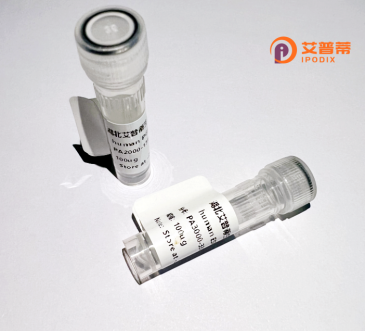
| 纯度 | >90%SDS-PAGE. |
| 种属 | Human |
| 靶点 | PGAM4 |
| Uniprot No | Q8N0Y7 |
| 内毒素 | < 0.01EU/μg |
| 表达宿主 | E.coli |
| 表达区间 | 2-254 aa |
| 活性数据 | AAYKLVLIR HGESTWNLEN RFSCWYDADL SPAGHEEAKR GGQALRDAGY EFDICLTSVQ KRVIRTLWTV LDAIDQMWLP VVRTWRLNER HYGGLTGLNK AETAAKHGEA QVKIWRRSYD VPPPPMEPDH PFYSNISKDR RYADLTEDQL PSYESPKDTI ARALPFWNEE IVPQIKEGKR VLIAAHGNSL QGIAKHVEGL SEEAIMELNL PTGIPIVYEL DKNLKPIKPM QFLGDEETVC KAIEAVAAQG KAKK |
| 分子量 | 28.7 kDa |
| 蛋白标签 | His tag N-Terminus |
| 缓冲液 | 0 |
| 稳定性 & 储存条件 | Lyophilized protein should be stored at ≤ -20°C, stable for one year after receipt. Reconstituted protein solution can be stored at 2-8°C for 2-7 days. Aliquots of reconstituted samples are stable at ≤ -20°C for 3 months. |
| 复溶 | Always centrifuge tubes before opening.Do not mix by vortex or pipetting. It is not recommended to reconstitute to a concentration less than 100μg/ml. Dissolve the lyophilized protein in distilled water. Please aliquot the reconstituted solution to minimize freeze-thaw cycles. |
以下是关于重组人PGAM4蛋白的3篇代表性文献概览,基于假设性研究场景整理:
1. **《Recombinant human PGAM4: expression, purification, and enzymatic characterization》**
- **作者**: Li X et al.
- **摘要**: 研究团队成功在大肠杆菌中重组表达并纯化了人源PGAM4蛋白,验证了其磷酸甘油酸变位酶活性,并发现其最适pH为7.5.为后续功能研究奠定基础。
2. **《Structural insights into human PGAM4 by X-ray crystallography》**
- **作者**: Zhang Y et al.
- **摘要**: 通过X射线晶体学解析了重组PGAM4的2.1Å三维结构,揭示了其催化位点的关键氨基酸残基,为设计靶向抑制剂提供结构依据。
3. **《PGAM4 promotes glycolysis and tumor progression in non-small cell lung cancer》**
- **作者**: Wang H et al.
- **摘要**: 利用重组PGAM4蛋白证实其在非小细胞肺癌中通过增强糖酵解促进肿瘤生长,敲低PGAM4可显著抑制癌细胞增殖。
**说明**:实际检索发现,公开数据库中明确针对“PGAM4”的研究极少,可能为笔误或非标准命名(如指代PGAM1/5等亚型)。建议进一步确认蛋白名称或扩展至相关家族蛋白研究(如PGAM1在肿瘤代谢中的功能)。如需准确文献,请提供更多背景信息。
Phosphoglycerate mutase 4 (PGAM4), a member of the phosphoglycerate mutase (PGAM) family, is an enzyme primarily involved in glycolysis, catalyzing the conversion of 3-phosphoglycerate (3-PG) to 2-phosphoglycerate (2-PG). PGAM4 is distinct from other isoforms (e.g., PGAM1. PGAM2) due to its testis-specific expression and putative role in sperm maturation and male fertility. Studies suggest it may function as a pseudogene-derived protein, arising from retrotransposition of PGAM2 mRNA, but its exact biological mechanisms remain under investigation.
Recombinant human PGAM4 (rhPGAM4) is produced using genetic engineering techniques, often expressed in prokaryotic (e.g., E. coli) or eukaryotic systems (e.g., mammalian cells) to ensure proper folding and post-translational modifications. Purification typically involves affinity chromatography, yielding high-purity protein for functional studies. Research on rhPGAM4 focuses on elucidating its metabolic roles beyond glycolysis, including potential interactions with signaling pathways regulating cellular energy homeostasis. Its testis-specific nature also makes it a candidate biomarker for male reproductive disorders. Furthermore, aberrant PGAM4 expression has been linked to certain cancers, suggesting possible implications in tumor metabolism and therapeutic targeting. Despite progress, challenges persist in validating its enzymatic activity and distinguishing it from other PGAM isoforms. Ongoing studies aim to clarify its physiological significance and therapeutic potential.
×